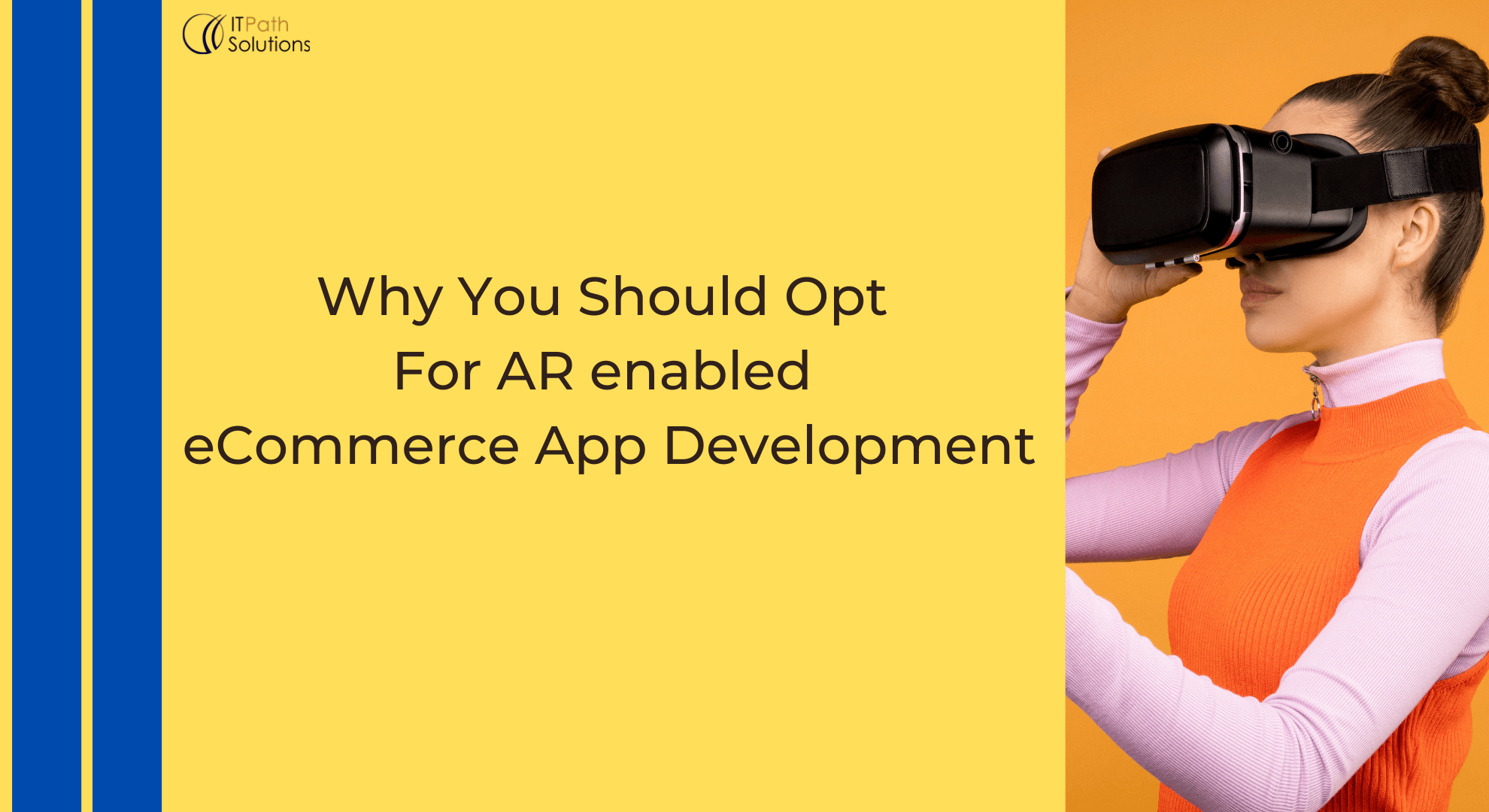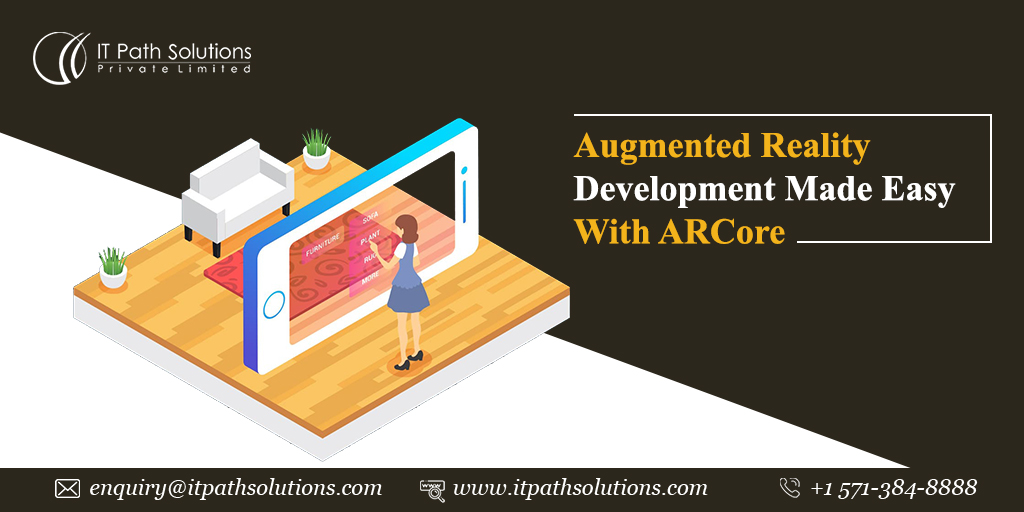Why You Should Opt For AR Enabled eCommerce App Development
Augmented Reality Development
As per recent research reports, the eCommerce industry will be worth $24.3 trillion by 2025 and will still have a CAGR of 11.2% YOY. To segment this massive market further, almost 72% of the purchases are done on mobile devices instead of desktop or other devices.
As such businesses that are to utilize or are utilizing eCommerce as a major sales channel need to stand out from the rest of the field and understand and solve customer needs and wants better than others. Providing better ways to get information on the product and make more informed decisions can help you and your customer by presenting all the unique features of your product to your customer and the customer will know about your product in more detail so that they can make an informed decision about the purchase. That is where latest technologies such as AR eCommerce app development comes in.
Current Shopping Experience
Right now most eCommerce companies offer apps or websites that are cross platform so that the end user can buy from anywhere and with a robust backend of their own or created through third party delivery agents, deliver the product to the end user. The major missing out that is happening especially for high ticket sales such as furniture is that customers and prospective buyers don’t get to experience or analyze the product fully as they can do in offline shops, as such high ticket sales are still carried out offline.
Right now, customers can buy products online after analyzing the product through written content and reviews and photos and videos posted by the seller.
There is a large scope for a technology that can provide a life like experience to the end users.

How AR/VR eCommerce App Development Can Help?
With AR/VR development you can provide a custom shopping experience instead of your customer just browsing on app or website. AR/VR can enhance the shopping experience of the end user by making them experience the product as if they were there and providing an experience that is close to a offline showroom.
There are certain benefits that only AR/VR can offer such as:
- Virtual trials of garments and glasses and other fashion items.
- Personalized suggestions and recommendations
- Virtual tours
- Virtual showcase of furniture for the customer’s location
- Trying on new hairstyle or makeup without actually doing it
Here are some examples of top Shopify stores utilizing AI & AR/VR technology to offer the best user experience to their users.
Industrial Applications of AR/VR for eCommerce
Let’s focus on three industries that could see the most immediate benefit in their eCommerce efforts with the help of AR/VR.
Furniture Industry AR/VR Solutions:
IKEA was a pioneer in the use of AR solutions for its furniture offerings. People could see how the furniture would look like inside their homes and take an informed buying decision.
With such AR technology enabled eCommerce platforms, buyers can put the furniture virtually inside their houses and move it around, select the right place, corner and also add other furniture items to complete the interior design.
Fashion Industry AR/VR Solutions:
In fashion industry, AR is used to virtually try out garments, specs and other fashion items before buying. As garments are returned the most amongst all the eCommerce items, by allowing people to virtually try it out, return rates are reduced.
Household Items Industry AR/VR Solutions:
When people need to buy common household items such as TV, Fridge and washing machines, they need to make sure that the aesthetic of the item and the requisite space is compatible witht he device they want to buy.
Key Development Parameters for Developing eCommerce AR Development
To start setting up AR you can use Unity, configure it with ARcamera and use SDKs of Vuforia or other applicable SDKs. Setup any animations and movements in Unity and start testing your AR features.
Here are some of the key things to keep in mind when developing an AR feature for the eCommerce platform.
- Connecting products and its variants to respective 3D models and materials.
- The viewer be responsive and adaptable to the web page or app page.
- Customizing the app and website platform for AR
- Creating an interactive, option rich menu.

Main Features for AR based eCommerce App
Social Sign Up/Login
Using existing logins from social accounts or emails for a quick signup and instant logins.
Chatbot Support
As users need to make a purchase decision, CRO activities such as chatbots can make a major difference in final conversion parameters. Even a single percentage increase in conversions can make a campaign successful.
Push Notifications
With push notifications, the store owner can stay in constant touch with the end user and inform them of latest promotions and offers.
Smart Search
With smart search, users can search for products, categorize for price, type and brand and other major categories and select the appropriate product.
In-App Camera
With in-app camera, users can upload an image to find product, scan barcodes and to generate virtual view using AR technology.
Customer Support
For common support queries, a backend customer support system can be crated that can act as a first line for initial and simple queries. Voice enabled AI and chatbots can be used here.
Multiple Payment Options
Providing all payment options makes it easy for your customer to conduct the purchase and builds trust as they can choose the paymenty method they are comfortable with.
Loyalty/Offers Programs
To entice the customers, store owners can setup promotional campaigns and offers for attracting customers and to clear past inventory.
Real Time Dashboard and Analytics
With real time dashboard, the store owner can see what;s happening in the store and can keep track of all the previous sales and customer queries.
AR Customization
WITH AR based customization, customers can create a virtual tryout of the product in question such as furniture, spectacles and garments.
Location Based AR
With location based AR, users can create an AR view in the pace that they are. By geo-tracking, the app can track where the user is and create an augmented view.
Technology Stack Required for AR based eCommerce Development
Here is a proposed tech stack for AR based eCommerce app.
- AR App Development Platforms – AR Core, AR Kit, Vuforia, Wikitude, Easy AR
- 3D Modeling Softwares – Maya, Blender, SketchUp, 3ds Max, Cinema 4D, Onshape
- AR Devices – Mobile Devices, Tablets, Smart Glasses, Virtual Retinal Displays
- Mobile App Platforms – Android, iOS
- Cloud Environment & CDN – Amazon, Cloudflare, MaxCDN
- AR App Development Engine – Unity3D, Unreal Engine
- Payments Gateways – Paypal, Braintree, E-Wallets, Stripes
- Push Notification – Twillo, Push.io
- SMS, Phone Verification – Nexmo, Twilio
- Email Marketing – Mail Chimp
- Managing Email – Mandrill
- Database Technologies – Datastax, Mongo DB, Cassandra, HBase, Mail Chimp Integration
- Real Time Analytics – Apache Storm, Google Cloud Data Flow
- AR Standalone Platform – WebGL (2D/3D Interactive Experience)
- AR Universal Operating System – Debian
- Streaming Media System – Helix Universal Server, Nimble Streamer, Wowza streaming
Conclusion
AR apps are being enabled by all major platforms. IOS 14 has some special features for AR. Android and many cross platform platforms such as Flutter are integrating AR features inside their platform as well. As such , Apps that offer AR features will become increasingly available on the market.
Drop us a line below if you are looking to develop your own AR solutions for your eCommerce business.
 Healthcare
Healthcare  Education
Education  Real Estate
Real Estate  Logistic
Logistic  Fitness
Fitness  Tourism
Tourism  Travel
Travel  Banking
Banking  Media
Media  E-commerce
E-commerce  Themes
Themes
 Plugins
Plugins
 Patterns
Patterns
